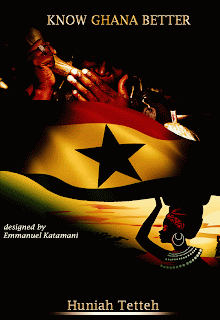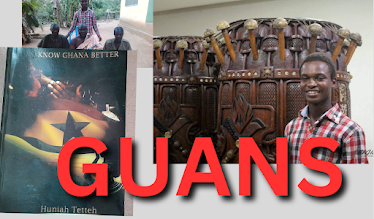THE EFUTU AND AWUTUS OF COASTAL GHANA
THE EFUTUS
The Efutu ancestors
lived with the Ga people when the others had left for the mountains. With time,
their dialect was fading away as they became bilingual Ga and Efutu speakers
and most of them alternated for the Ga language. The Ga people were confused about
the type of language they were speaking. It seemed to be a mixture of languages.
Also they had mixed up with the Ga people hence the name “Efutu” which means
“mixed-up” in the Ga language.
The Efutu learnt fishing
and after some years of living with the Ga-Dangmes, they decided to leave to a
desolate land where they can salvage their language which had broken down into
dialects. The only surviving speakers were few so they had to divide themselves
into groups. They elected a land they had previously settled on during their
migration as Shuoyis to Ayawaso. So they set off to the previous place where
they had temporally settled when they were the once unified Shuoyi tribe; moreover,
it is much closer to the Ga people and the sea which means and they could continue
their bond with the Ga people and still go fishing in addition to their farming
activities.
The first group set off under the leadership
of one Oma Odefey Akondoh I to a place which when they got to they said in
their Old Guan dialect as “ani na ba nfe, ani gbina, ani sɔ inya” meaning that
“we have come far and we are tired, let us rest.” So the place was called
resting place which is “Sɔ inya” in Old Efutu subsequently Senya.
The second group got
to their destination and they said, “sisi mpa, ani sina eye” meaning “we have
reached far, let us now settle here.” Thus, the name SIMPA came to stay as the
name of the town.
The other group of Efutus
came to be known as Awutu. From Kokrobite at Accra, they came to a place
situated between Borteanor and Nyanyano which they called in their language as
Idepa which means “sleeping place.” Idepa has been corrupted to Dampa or
Dampano. The Awutu were led by Nai Wettey Agyaman I to their present
settlement. “Nai” is the title for chiefs at Awutu whereas it is “Nii” in Ga
land. The name Awutu means “mixture” in the Efutu language whereas “Efutu”
means “mixture” in the Ga language.
The Ga people have
corrupted the name Awutu to Obutu hence the Efutus are also known as Obutu. At
Awutu, there is the “god of the sky” who is called Bireku. As well during the
Awubia festival which is known among the people of Senya as Akumasi celebrated
from June to August has a rite also called Bireku. “Ku bire” is the action or
verb and Bireku is more of a noun so Senya and Awutu are well known to perform
those rites thus the reason why Senya and Awutu are also known as Senya-Bireku
and Awutu-Bireku respectively.
Awutu has clans and
they are Dode, Shiapa (from Ga shiakpa meaning “good home”) and Bire. Dode is
the eldest and the paramouncy. Awutu is the closest to the Ga people than all
the Efutu communities and Awutu history furthers that after it was established,
the western Gas wanted Nai Wettey Agyaman I to rule over them perhaps due to
his riches but the Awutus were in discord. Efutu land was once rich in Gold and
other precious minerals for that matter the abandoned Dutch Fort called Goede
Hoop is situated at Senya-Bireku. Nai Wettey I is said to have his left arm
fully arrayed in golden ornaments.
A bid to get hold of
him to bring him to Ga land was resisted by the Awutus. The Gas held to his
right hand and the Awutus held to his left hand. Like a tag of war, the western
Gas dragged Nai Wettey I to Ga land and the Awutus also dragged him to their
home. Oral traditions of the Awutu stated that he died out of the process.
Perhaps his arms were dislocated leading to severe pain of which he passed out
in shock leading to his demise.
After some time, the
Efutus multiplied and they established new settlements and they can now be
found at Bodwiase, Ojobi, Kweikrom, Akotsi, Senya-Posua, Senya-Bonsueku,
Gomoa-Winneba and some other minor towns.
Years after they had
settled on their lands, they began to celebrate the Hɔmɔwɔ festival but they
named it in their local dialect as Akumasi. “Akumasi” simply means “no more
hunger” and it is the predominant festival celebrated throughout the Efutu
kingdom. The Ga ways became part of them that even till now, Ga is spoken in
the traditional Efutu communities natively and they even use Ga names. At Efutu
during the Akumasi, they chant the Ga song “Awo! Awo!” and has been slightly
branded in their language. So below is the chanting in both Efutu and in Ga.
EFUTU GA
Ewo oo! Ewo oo! Awo
oo! Awo oo!
Apa ei! Mangye sra! Aba
ei! Bleku tsɔ (or muje nu)!
Ɔma’n awuro nu ei! Awuro nu ei! Nyɛ
ha aawo nu ei! Aawo un ei!
Nsu ei, nsu! Enu a,
enu! (enu is fish) Nsu
ei, nsu! ɛnam oo, ɛnam! (ɛnam is fish)
Ɔmɛngy’ei! ɔmɛngya! Omanye
ei! Omanye aa!
Da aye, yi awuro, Adebaŋ
kpɔtɔ
Ewo oo! Ewo oo! Awo oo! Awo oo!
An epidemic once befell the people of Simpa. They were distressed that
they went to see their chief priest. The chief priest confirmed that the gods
were angry and that a human sacrifice was needed to be made every year to
pacify them and to take away the curse. The elders of Simpa went home and
thought about it and concluded it would be impossible since then it meant they
would have to murder their children every year. They went back to the priest
again with the issue and the priest had to change the remedy to a live lion
every year. Still, that was a problem to the elders and they proposed it be
changed. It was then again changed to a live deer sacrifice every year. So they
agreed to that and a hunt for a live deer was inaugurated. On their first
catch, one of the Asafo groups was exclaiming “Ani wini nba.’’ meaning “we’ve
won”. Winneba finally came to stay as the name of the people and the name of
the festival came to be known as ABOAKYIR.
The name Bireku as
seen in Senya-Bireku and Awutu-Bireku also comes from the fact that during the
worship of their local gods; they say it in Efutu as Bireku where “Bire” is the
“rite” and “ku” is the act of worship. During the Akumesi, “Bireku” is performed
both at Senya and at Awutu. It was from Efutu land that the Kete-Krachi
migrated and established the Kete-Krachi kingdom.
Among the Efutu
languages, Awutu spoken by Bireku people is very conservative. The dialects of
Senya, Winneba and Ojobi etc. have evolved with time with that of Winneba
having extensive Fante borrowings. Awutu still conserves much of the Ancient
Guan vocabulary although it has adopted some of the contemporary Efutu
vocabulary used daily within the Awutu-Efutu communities. Awutu is the easiest
dialect for other Guan tribes to learn should they wish to learn the Efutu
language; but then Awutu is the most difficult language for native Efutu
speakers as they may not comprehend and sustain a whole communication in it.
Awutu on the other
hand looks more like Nzema and Anyin too. Awutu being a very conservative Guan
language could be seen in the example “Mprobi” meaning “little/small” in Awutu
which cuts across most Guan languages as “Mkplɛbi, mmlɛbi, mprɛbi, kpalibi etc.”
However, it is said as “mprɔko” in the other Efutu dialects. “Ntsu” meaning
“water” is the same in Awutu and majority of the Guan languages whiles the
Efutu says it as “Nsu.” There are a whole lot which cannot be listed entirely
in this research work.
The Efutu language as
well has a whole lot of borrowings from the Ga language which binds the two
languages together.
The River Ayensu got its name from the Efutu language, that is, “Ayɛ
nsu” meaning “that is water.”
- Reference:
Tetteh, H. 2021. Know Ghana Better (Premier Edition). Accra: 2021








Comments
Post a Comment
Thank you! Gladly appreciate your feedback. You can also reach out personally via whatsapp or follow me on youtube/facebook Huniah Tetteh.